
Edward Winter

In Nigel Short: Chess Prodigy by David Short (Faber and Faber, 1981) the narrative of Short père is interesting and readable, but the book is dominated by George Botterill’s excellent annotations of the 67 illustrative games (which include losses and some scrappy wins). As editor, Leonard Barden has made the work one harmonious whole.
(88)
The April 1982 CHESS has a notable and provocative article by David Levy entitled ‘Is Nigel Short a Has-Been?’, the general drift being that Nigel Short’s commitment to being educated has had a drastically adverse effect upon his playing career. To quote just a line or two:
‘... I would say to a young player of his talent, “Play chess and improve as much as possible. You can always pass exams and go to university later, if you want”.’ ...
(136)
The paragraph on David Levy’s CHESS article ‘Is Nigel Short a Has-Been?’ has provoked a fair amount of correspondence. We would have been perfectly happy to open up these pages to a balanced debate by readers on all the pros and cons of Levy’s viewpoint, but all reaction has fallen into the latter category without exception. We will limit ourselves to quoting W.H. Cozens (Ilminster, England) on the subject:
‘A curious thesis. If it is true – and I repeat IF, for I remain to be convinced – that Short has forfeited a probable grandmaster achievement by over-attention to school work, he will be just one such person to set against dozens, or even hundreds, who have wrecked their academic prospects by over-indulgence in chess.’
(247)
On 24 February 2023 Nigel Short made the following comment on his Twitter page:
‘Better a has-been than a never-was.’
C.N. 740 quoted from pages 22-23 of Nigel Short: Chess Prodigy by David Short (London, 1981):
‘If Nigel has one “favourite move” it has to be e4-e5.’
See too Pet Moves in Chess.
René Olthof (Rosmalen, the Netherlands) approvingly draws our attention to the views of Nigel Short in the 2/1986 New in Chess:
‘I always liked Nimzowitsch – until recently. I got this book about Carlsbad 1929, played through all his games and they were really bad! I thought: If this is what he played like, on average, then he wasn’t a very good player. You can take any player in the world and show their best games and make them look brilliant. Nimzowitsch is not as original as people thought he was. Many of his ideas were extensions of earlier ideas of Steinitz. Actually, I’m more impressed with modern players. I’m still stunned by Fischer and more so recently. Look at his results, my goodness! He has been winning tournaments with a hundred per cent score. How is it possible? And when you play through his games they all look so easy! In 1972 he didn’t behave very well, but I liked him.’
In his New in Chess interview Short also has some strong criticisms of chess coverage in English newspapers. Good for him.
(1199)
The feature article Nimzowitsch’s My System quotes a range of comments on the book, and two recent ones, both negative, are added now, from Chess for Life by Matthew Sadler and Natasha Regan (London, 2016).
On page 143 Nigel Short described My System as ‘a dreadfully boring book’, and on page 164 Yasser Seirawan observed:
‘Personally I found Nimzowitsch unreadable. His ideas on overprotection were over-the-top. He wasn’t the first person to play prophylactically. For some people, though, this book is the cat’s meow. I’ve been told that Nimzowitsch is much better in the original German but some of the humour and nuances have been unavoidably lost in translation.’
(9792)
An extract from C.N. 1387, written in 1987 (see Rebuttals):
The BCM is even capable of dropping a news story half way through if it looks likely to show Mr Keene in unfavourable light. The most recent example concerns a court writ (behind which was Raymond Keene and Thames Television) issued in February against Aly Amin of Chequers. Mr Amin was prevented by the subsequent High Court hearing from bringing out a book on the Kasparov-Short speed chess event until the recordings of all six games had been shown on television. One can appreciate the reasoning behind such a restriction, which aimed to ensure that the suspense of the match was not spoiled for viewers. The BCM clearly considered the story an important one, even discussing it in its March editorial. Its April issue quoted a Thames Television spokesman’s comment on the High Court verdict: ‘This is a significant victory which safeguards delayed transmission of chess on television and will enable us to explore future similar projects’. So far, so good. But on 16 March Mr Keene’s own book on the match was rushed out early. At that time two games had still not been screened, and viewers’ interest was therefore well and truly spoiled – by the very parties who had used the courts to stop Aly Amin from doing the same. So did the fearless BCM draw attention to this hypocrisy? Not at all. The May issue (page 194) reviewed the Keene book – uncritically, of course – but the legal dispute, extensively reported up until then, was quietly dropped.
Roger Lancaster of Chequers, London sends us a copy of a letter written by him to news flash giving further details of the legal dispute regarding books on the Kasparov v Short match. Since the full text is published on page 10 of the 10 July 1987 news flash we give just a brief summary here. On 10 February M.J. Feldman, a Thames Television producer, made an affidavit: “... it was critical that the results and in particular the moves made by the players were not published until each game had been transmitted in order not to spoil the viewers’ interest and enjoyment of the programmes. ... In an accompanying affidavit, Raymond Keene swore that he agreed with Mr Feldman’s statement. However, a copy of Mr Keene’s Batsford/Thames book was in the hands of Chequers’ solicitors when only three of the six match-games had been transmitted. Mr Lancaster puts the central point very well:
‘It will be interesting to know, and indeed the High Court may wish to know, how Messrs Feldman and Keene reasoned that a book written by an outside party would “spoil the viewers’ interest and enjoyment” while a book co-produced by Thames Television and written by Keene would not.’
(1452)
Wanted: specific information on how the court case ended.
As regards titles for life, a good contribution to the debate has been made by Nigel Short in a Letter to the Editor published on page 3 of the 9 October 1988 issue of Inside Chess. To quote the essence of his proposal:
‘There can be no doubt that the Grandmaster title is not what it was meant to be: an honor awarded to only the finest players in the world. An examination of the rating list shows that far too many of these “Grandmasters” are in fact remarkably weak: 56 of them are rated below 2450, the minimum rating required to obtain the title. A further dozen or more Grandmasters are inactive altogether. Grandmaster inflation is eroding the title’s value almost by the day. Something should be done about it urgently.’
Short proposes that Grandmasters whose Elo rating drops below 2450 on two consecutive Rating Lists should revert to being International Masters, and that Grandmasters who play fewer than ten rated games in two years should also lose their titles. Such ‘former Grandmasters’ (our term) could recover their titles by making a single Grandmaster Norm, providing that they also secured the 2450 minimum rating.
Since Short’s open letter was addressed to the Grandmasters’ Association, it was not the place to discuss parallel cases where ‘International Master’ is a misnomer.
Page 3 of Inside Chess, 10 November 1988 has a playfully sarcastic reply from Andy Soltis which does not lend itself to shortening here. Perhaps a reader can phrase the counter-arguments for Chess Notes more maturely.
(1735)
The lack of clarity and precision regarding quotes is illustrated by page 151 of Schott’s Sporting Gaming & Idling Miscellany by Ben Schott (London, 2004), which has eight source-free citations on chess. At least one is simply wrong (the attribution to Lenin of the saying ‘Chess is the gymnasium of the mind’ – see C.N. 3626), and the first of the eight is attributed to Nigel Short:
‘Chess is ruthless: you’ve got to be prepared to kill people.’
That quote is also on many webpages with, mirabile dictu, what looks like a specific source: The Observer, 11 August 1991. However, we have found that the newspaper merely listed it in its ‘Sayings of the week’ (page 18), with no particulars. Chess was in the news at the time, and that same day the Short v Gelfand world championship quarter-final match began in Brussels.
Nigel Short informs us:
‘I have no recollection of having made that particular statement, although it sounds like something I might well have said in my younger days. I would guess it is probably authentic.’
Can a reader help us to find out more?
The inscribed feature below comes from the programme for the 2002 ‘Russia versus the World’ event in Moscow:

(4238)
Addition on 23 May 2024:
There are references by Nigel Short to ‘killing’ at the end of a brief 1991 documentary film On The Line (reporter: Mark Whitaker).
The following item was posted after a reader enquired in C.N. 4572 whether the score of Short v Reshevsky, Lugano, 1985 could be found.
From Nigel Short (Athens):
‘Unlike Winston Churchill, I never imagined that my each and every creation would be of interest to posterity. By the time that I realized that my chess games, at least, were of some interest to historians and enthusiasts, my poor archival habits were so deeply ingrained that I was unable to change. As a consequence, a number of even relatively recent games have been lost, such as from Shymkent, Kazakhstan, 1999. Therefore, alas, the short reply regarding C.N. 4572 is “No, I do not have the game-score”, although I can tell you, from memory, that it began 1 e4 e5 2 Nf3 Nc6 3 Bb5 a6 4 Ba4 Nf6 5 O-O Be7 6 Re1 b5 7 Bb3 d6 8 a4 Bd7 (8...Bg4 is more regular) 9 c3 Na5 10 Bc2 c5 11 d4. That is it, I am afraid.
Other titbits about the game:
1) It started late (rather scandalously, in my opinion) to accommodate Reshevsky’s religious beliefs. While this may be just about permissible, at the discretion of the opponent, at the start or during the middle of the event, it is an outrage in the last round, when prize-money is at stake and when the players in question, knowing other results, possess the knowledge of whether to strive for a win and risk defeat or to settle for a draw.
2) The conversation between Reshevsky and me during the game, as reported by John Nunn, is more or less completely accurate. I exerted a lot of pressure in the middlegame, which brought Reshevsky to the brink of defeat. However, he defended with great resourcefulness in time-pressure and extricated himself with ingenuity. I was very impressed that he could still play so well at such an advanced age. I was less impressed, however, with his comment “You see, you could have saved yourself a lot of time” which he made as we signed the score-sheets. It was a rather bitter remark by a man who resented having been made to sweat profusely.
My only other Reshevsky recollection, which is not connected with Lugano, is that when we met at the Kasparov v Karpov match in New York in 1990 he asked me to help him find some tournament invitations in England. I did not have the heart to tell him that England was a chess wasteland, so I said I could see what I could do. I would like to think that I will go out the same way – still hungry for the game until the last – but I probably won’t.
On a tangentially related topic: would anyone have the game-scores of the World Junior Championship from Mexico in 1981? It is undoubtedly one of the most important tournaments in my career for which ChessBase has no games (Cvitan, Salov, Ehlvest, Hjartarson, Milos, Morović and Agdestein were among the participants). Unfortunately, I cannot even remember whether any bulletins were produced.’
(4607)
Ian Matthew (Portsmouth, England) points out that a number of Nigel Short’s games in the 1981 World Junior Championship were included in the FatBase database. It has yet to be ascertained whether any bulletins on the event were issued.
(4618)
Addition on 15 March 2020: Richard Reich (Fitchburg, WI, USA) notes that Nigel Short gave his game as White against Reshevsky (Lugano, 9 March 1983) on his Twitter page on 8 February 2020: 1 e4 e5 2 Nf3 Nc6 3 Bb5 a6 4 Ba4 Nf6 5 O-O Be7 6 Re1 b5 7 Bb3 d6 8 a4 Bb7 9 c3 O-O 10 d4 h6 11 Nbd2 Re8 12 d5 Nb8 13 Qe2 c6 14 dxc6 Bxc6 15 axb5 Bxb5 16 Bc4 Bxc4 17 Nxc4 Nbd7 18 Na5 Qb6 19 Qc2 Rab8 20 Re2 Rec8 21 Be3 Qc7 22 Nd2 d5 23 exd5 Nxd5 24 Nac4 Nxe3 25 Nxe3 Qc6 26 Ne4 Bc5 27 Rd1 Bxe3 28 Rxe3 Nc5 29 Nxc5 Qxc5 30 h4 a5 31 Qe2 Re8 32 c4 Rb4 33 b3 a4 34 Rd5 Qc6 35 bxa4 Qxc4 36 Qxc4 Rxc4 37 Rexe5 Drawn.
Nigel Short has been reading Capablanca’s book on the Havana, 1913 tournament and comments to us:
‘I find Capablanca’s accusations against Jaffe, and by implication Marshall, a little unbecoming. Of course, the bare game-scores do not necessarily tell the whole story, but I see nothing in the moves themselves that suggests any connivance between the two. It looks like a case of sour grapes by Capablanca, and I do not see how a 1½/2 score for Marshall against Jaffe was anything other than a fair reflexion of their difference in ability.’
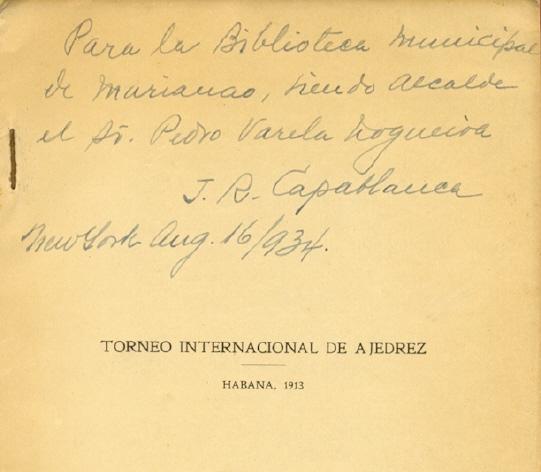
In the double-round Havana tournament Frank J. Marshall and Charles Jaffe met in rounds one and eight. The scores are given below with Capablanca’s notes:
Frank James Marshall – Charles Jaffe1 d4 d5 2 c4 e6 3 Nc3 Nf6 4 Bg5 Nbd7 5 e3 c6 6 a3 Bd6 7 Nf3 O-O 8 Qc2 dxc4 9 Bxc4 e5 10 Rd1 Qc7 11 h4 exd4 12 Nxd4 Be5 13 Ba2 Re8 14 h5 Bxd4 15 Rxd4 Qe5 16 Bxf6 Nxf6 17 Rhh4 Bf5 18 Qd2 h6 19 Qe2 Rad8 20 Rxd8 Rxd8 21 Rb4 b6 22 Qf3 c5 23 Rf4 Be6 24 Bxe6 Qxe6 25 Ne4 Nxe4 26 Qxe4 Qxe4 27 Rxe4 Kf8 28 Ke2 Rd7 29 g4 Drawn. ‘No comments have been appended to this game because the annotator is convinced that Black made no effort at all to win, and it is pointless to indicate the weakness of various moves when in fact they were played with the sole object of avoiding defeating one of the competitors.’
Charles Jaffe – Frank James Marshall1 d4 d5 2 Nf3 c5 3 dxc5 e6 4 e4 Bxc5 5 exd5 exd5 6 Bb5+ Nc6 7 O-O Nge7 8 Nbd2 O-O 9 Nb3 Bb6 10 c3 Bg4 11 Be2 Qd6 12 Nfd4 Bxe2 13 Nxe2 Ng6 14 Nbd4 Nxd4 15 Nxd4 Bxd4 16 Qxd4 Rfe8 17 Rd1 Re2 18 Rb1 Rae8 19 Be3 Ne5 20 Qxd5 Re1+ 21 Rxe1 Qxd5 22 Bd4 Re6 23 Rbd1 Rg6 24 White resigns. ‘As with the first game between these two masters, no annotations are required because it is obvious that Jaffe did not make any attempt at winning, and his blunder on the 20th move is best concealed and the game passed over.’
As noted in our feature article on Jaffe, page 5 of Jaffe’s Chess Primer (New York, 1937) stated:
‘Charles Jaffe’s career has been both remarkable and tragic. At the very height of his fame his progress was intercepted by Jose Capablanca. At the Havana Tournament of 1913 Mr Capablanca stated to the press that since Jaffe had come to Cuba for the sole purpose of helping Marshall win, he would never again play in a tournament where Jaffe was entered as a contestant. It is certainly deplorable that Messrs Cassel and Helms, the American chess correspondents, not only believed these charges but also aided Capablanca by successfully keeping Jaffe out of all those American Tournaments in which they had influence. It might be noted that the great Dr Emanuel Lasker was driven from the US by very much the same tactics. He was barred from the New York Sextet Master Tournament of 1927.’
The Capablanca v Jaffe feud was also discussed on page 48 of our book on the Cuban, where it was noted, inter alia, that after Havana, 1913 Capablanca and Jaffe never again met in a tournament.
What more can be discovered about the dispute? In particular, can forgotten statements by any of the three masters be found?
(4642)
Page vii of One Move and You’re Dead by Erwin Brecher and Leonard Barden (London, 2007) records that Barden ...
‘... was the first to predict in print that Garry Kasparov (then 11) would become world champion and that Nigel Short (then nine) would become Kasparov’s challenger.’
Regarding the Kasparov forecast, we are grateful to the Guardian Research Department for sending us the column in question (Guardian, 24 February 1975, page 16) and for permission to reproduce it here:
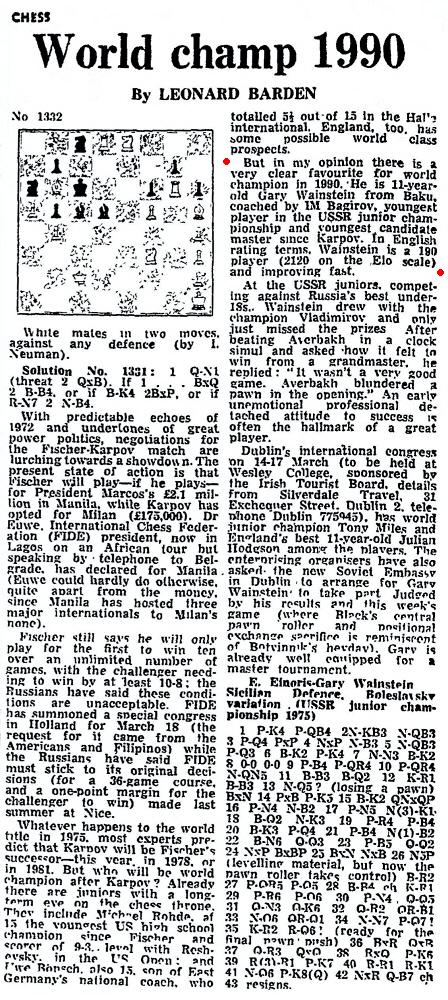
In C.N. 507, after the prediction’s appearance on pages 5-6 of the book on Kasparov Fighting Chess (London, 1983), we described it as ‘an amazing piece of talent-spotting’. Fighting Chess called the passage ‘the first western report’ on Kasparov.
Further to the remarks about English players in the above Guardian column, Mr Barden informs us:
‘My comment that “England, too, has some possible world class prospects” was a reference to both Julian Hodgson and Nigel Short. It was not until March-April 1975, after Short had performed impressively in Jersey and in a junior event in London, that I rated him ahead of Hodgson, allowing for age, and as a potential rival for Garry Kasparov. At the end of the London event I asked Čenĕk Kottnauer, whose opinion on juniors I regarded highly, to analyse and play a game with Short, and Kottnauer was greatly impressed.
The invitation to the Soviet Embassy for Weinstein to play was on my prompting, my grounds being that he would be nervous on his first journey to the West and that Hodgson could gain a psychological edge for battles to come. Moscow refused.
My forecast in the Guardian of 24 February 1975 was made about 15 months before Botvinnik went into print with his famous remark about the future of chess being in Kasparov’s hands.’
(5783)
Nigel Short asks for striking examples of magazine reports by leading masters on their simultaneous displays. Of particular interest will be reflective accounts, rather than the mere chronicling of results.
(6198)
See too C.N.s 6333 and 6503.
From Nigel Short:
‘I qualified as an International Master at Hastings, 1979-80 at the age of 14 (I was born on 1 June 1965), and my title was ratified by FIDE at its Congress in Malta at the end of 1980. Before that time, had anyone obtained the IM title at a younger age?
The recipients of the IM title at FIDE’s Congress in Venice (October 1967) included Henrique Mecking, who was born in early 1952. At which event did he qualify for the IM title?’
(6419)
The topic was discussed in C.N.s 6422, 6423, 6428, 6429 and 6436.
Most of the references to chess in The Fry Chronicles by Stephen Fry (London, 2010) concern one of his closest friends, Kim Harris. From page 81:
‘Aside from his proficiency at Latin and Greek Kim had another skill and at a level of brilliance that seemed to me to be quite superhuman. He was a chess Master. At Bolton he had played with, and to some extent mentored, Nigel Short, who was already becoming well known as the greatest prodigy England had ever produced. At the age of ten Short had beaten the great Viktor Korchnoi and now at 14 was on the verge of becoming the youngest International Master in history. Kim was “just” a Master, but that meant he was skilful enough to play blindfold, a trick I never tired of urging him to perform. Without any sight of the board he would demolish all comers.’
The term ‘Master’ is used loosely in connection with Kim Harris, but during the period in question his name appeared as a participant in Oxford v Cambridge Varsity matches. For instance, on page 243 of the June 1979 BCM Harry Golombek gave Harris’ loss to Simon Finn, who ‘produced a fine knight sacrifice that won convincingly and secured for him the prize for the best game played by Oxford’. Harris appeared in group photographs in the June 1980 BCM (page 310) and on page 162 of the May 1981 issue.
Which chess websites Stephen Fry may visit we do not know, but this general remark on page 95 may be noted:
‘... trollers on internet sites ... who specialize in posting barbarous, mean, abusive, look-at-me, listen-to-me anonymous comments on YouTube and BBC “Have Your Say” pages and other websites and blogs foolish enough to allow space for their poison. Such swine specialize in second-guessing the motives of those who are brave enough to commit to the risk of making fools of themselves in public and they are a blight on the face of the earth.’
(6839)
From Nigel Short:
‘Kim Harris played on board one for Bolton School in my first year there (1977). He also represented Lancashire on a number of occasions during that relatively brief period when he was an active player. While I do not recall his precise rating peak, his playing strength was over 190 BCF (roughly 2200 Elo), so Stephen Fry’s loose usage of the term “master” is perhaps not that inappropriate if one makes a comparison to the title of USCF Master.’
(6842)
The following article by G.H. Diggle was given on page 33 of Chess Characters (Geneva, 1984), having originally appeared in the April 1978 Newsflash:
‘The Badmaster (just emerged from long chess hibernation) has actually been “going places” and in good company too. In February he was invited to join 20 or more denizens of the City of London and Fleet Street and take a board against Nigel Short (the world’s top chessplayer of his age) in the “Lloyds Bank City Trophy” simultaneous challenge match.
The event was brilliantly organized and took place in the sumptuous edifice of Salters’ Hall, Barbican. Gone, it seems, are the days when chess and penury walked hand in hand, and “simuls” were economically staged in disused warehouses. Salters’ Hall, with its lofty ceiling and antechambers filled with portraits of past “saline celebrities”, provided an awe-inspiring setting; moreover the Press were there in full force, and their massive photographic apparatus gave the arena the appearance of a large operating theatre.
But this environment did not seem to worry the chief performer in the least. When introduced into our midst by that genial “Ringmaster” Mr L.W. Barden and then left to fend for himself surrounded by four and twenty portly citizens of a great Metropolis, a less cool customer might have exclaimed in the words of the psalmist: “O go not from me, for trouble is hard at hand – fat Bulls of Basan (or, more appropriately, of the Stock Exchange) close me in on every side.” Indeed, the unfeeling “L.W.B.” had in his introductory remarks actually briefed the ferocious oxen not to adopt a defensive stance, but to lower their horns and charge their slender and solitary foe from all directions. It soon became obvious, however, that the youthful matador could look after himself. He began by doling out an assortment of P-K4s, P-Q4s and P-QB4s in quiet “Maundy Thursday” style; and as battle proceeded he appeared (so thought the BM) after the first dozen moves to know, before he reached each board, the precise position that was on it last time he called. Gradually he obtained the upper hand all round; the end of the third hour witnessed the “collapse” of several “stout parties”; and the BM himself, with a bad game and a train to catch, actually fled from the field, only to be warned that his position would be “sat on” by that well-known coroner, the Chess Editor of The Times. (In fact, just as he was sneaking off, that functionary arrived. It was like meeting the undertaker coming up the stairs.) We heard later that the young hero (whose chess manners were as excellent as his chess) had held the ring for four hours and 20 minutes without a break, scoring 23 wins and one draw (against Mr Frank Leonard of the Stock Exchange, who emerged without loss from a complicated “Bull” operation lasting for 40 moves).’
(7089)
This article by G.H. Diggle (Newsflash, July 1980) was reproduced on page 59 of Chess Characters (Geneva, 1984):
‘The BM, “peering and blinking” through the current BCM “as is his custom of an afternoon”, was suddenly roused from lethargy when in the Games Department (Miles v Short ) his eye caught “a horrible move” by White, followed two moves later by “a horrible shock” for the distinguished grandmaster. Out came the BM’s pocket chessboard with all dispatch. For fortunately, in spite of the detested algebraic notation, the score was at least presented in decent columnar form with notes by “W.R.H.”, and not served up (as too often happens) with symbols, brackets, notes and numerals all jumbled into one revolting mass of chess spaghetti.
By the 15th move Nigel (whose positional judgement was more than once praised en route by W.H.R.) was leading by two exclamation marks to nil. But he then thought fit to perpetrate that lowest of all combinational manoeuvres and Badmasters’ talisman – yes, bishop takes king’s rook’s pawn, check!! Needless to say, this gave his eminent antagonist the aforesaid “horrible shock” – probably not so much at “finding himself completely lost” as at such a raspberry having been blown in an exclusive “Phillips & Drew” drawing-room filled with respectable grandmasters. Had nobody told the “wretched boy” that such a move was only permissible in village clubs such as “Toad-in-the-Hole” where (as once recounted in CHESS by a very unreliable authority) a low fellow named Bloggins tried it on with considerable success, “especially against nervous opponents who would not take the bishop, but just moved the king instead, losing a pawn for nothing”?
After this, “the rest” should have been “silence”. But the wily grandmaster proved a most refractory corpse, and we were treated to a further 40 moves’ running battle between two very agile minds. So many pawns had already gone that “strategical motifs”, “strong and weak squares”, “thematic advances” and suchlike mummery were swept into the dustbin, and only pure observation remained. One might have expected the younger and fresher brain to have speedily carried out the burial. But in all such cases the “corpse” has one conspicuous advantage – frequently he has only “Hobson’s choice” to worry about, while his deserving but hesitant foe is so bemused with networks of alternative roads leading to the promised land that he inevitably drives up the only one that doesn’t, and his engine finally stalls. So it was in this case. But no-one will think any the worse of the driver, beset as he must have been by the presence of innumerable well-wishers mentally “honking him on to victory” from the wings.’
(7999)
See too G.H. Diggle, the Chess Badmaster.
On page 26 of the April 2004 Chess Life Larry Evans wrote:
‘“So it’s to be Short and it will be short”, quipped Kasparov upon learning the name of his challenger (who eliminated Anatoly Karpov and then Jan Timman, to reach the top).’
In reality, the famous quip was made by Kasparov during the Manila Olympiad in June 1992, long before the Short v Timman Candidates’ final (which ended on 30 January 1993). From page 462 of Garry Kasparov on Garry Kasparov Part II: 1985-1993 (London, 2013):
‘... journalists had asked me who would win the forthcoming final Candidates match – Timman or Short? – and how my next world championship match would end. To the first question I replied: “It will be Short.” And, laughing, I made the same reply to the second question: “It will be short.” On learning of this from the tournament bulletin, Short took offence ...’
In an interview with Dirk Jan ten Geuzendam (see page 54 of the 5/1992 New in Chess) Short light-heartedly dismissed Kasparov’s remark (which he gave as ‘It will be Short and it will be short’).
(8376)
C.N. 8376 pointed out incorrect information about when Kasparov made his ‘it will be short’ quip: it was in June 1992, i.e. some six months before the Short v Timman Candidates’ final.
Kasparov mentioned that the joke was reported in a bulletin of the Manila Olympiad, held in June 1992. Can a reader kindly forward us a copy?
(9221)
The bulletin (June 1992) of the Manila Olympiad has been provided by Henk Chervet of the Koninklijke Bibliotheek in The Hague:
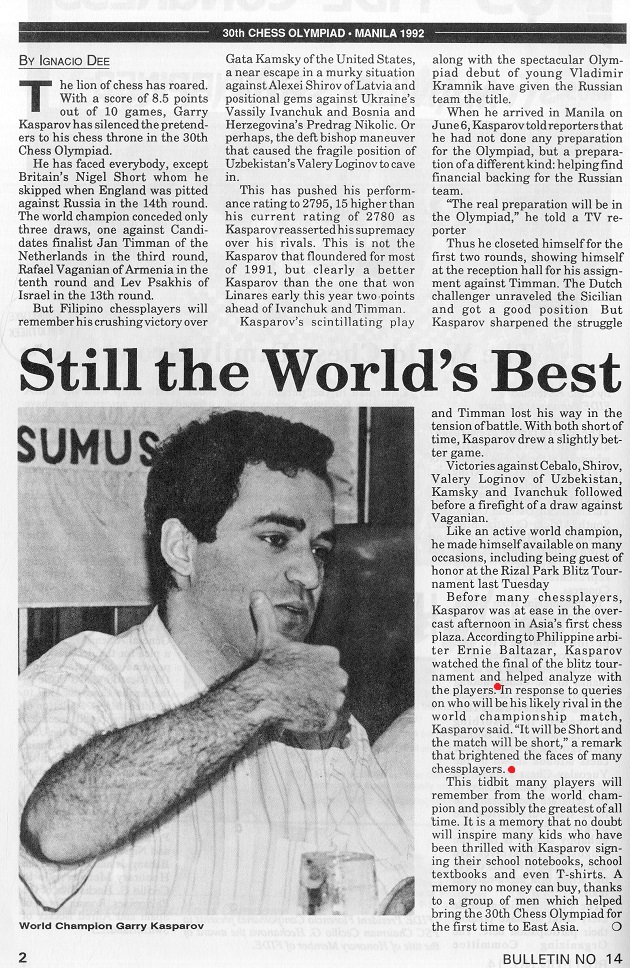
(9251)
Below are the last two names on a list of challengers on page 279 of Keene On Chess by Raymond Keene (New York, 1999):

The respective dates should obviously be 1993 and 1995.
Mr Keene, though, stuck to his guns. From page 280 of his Complete Book of Beginning Chess (New York, 2003):

(8434)

Inscriptions on the front cover of the 1993 Kasparov v Short match bulletins
On page 11 of the 7/1993 New in Chess, Hans Ree described The Times’ reporting as ‘an embarrassing collection of hype and half-truths’. But what about the outright untruths too? A few examples follow.
The newspaper’s (premature) announcement, by Daniel Johnson on 31 March 1993, that it had secured the Kasparov v Short match asserted that The Times had offered ‘the largest prize fund in the history of chess’. In fact, it was smaller than the purses for Kasparov v Karpov, 1990 and Fischer v Spassky, 1992.
The Times’ frequent references to the closing stages of the 1984-85 Karpov v Kasparov match were flatly false. On 27 February Raymond Keene wrote that ‘Kasparov revived and began to win game after game’. On 1 April Walter Ellis claimed that Campomanes had stopped that match as Kasparov ‘began to move ahead of the “approved” champion, Anatoly Karpov’, while a leading article the same day affirmed that the match was stopped ‘after Kasparov had won several games in a row’.
[Addition on page 271 of Kings, Commoners and Knaves: The misinformation has continued. On page 49 of Man v Machine by Raymond Keene and Byron Jacobs with Tony Buzan, we are told that the match was stopped ‘just as Kasparov had started to win a series of games’.]
General chess history fared no better. On 26 June Raymond Keene wrote that one of Reuben Fine’s triumphs in the 1930s was ‘share of first prize with Capablanca at Nottingham, 1936’; on 21 August his column claimed that Gustav Neumann won a tournament four years after he had died; on 9 September he erred by 30 years regarding the origins of the Marshall Gambit in the Ruy López.
The Times even proved unreliable about itself. On 18 May Ian Murray, after showing total ignorance about the conditions for pre-Second World War world title matches, blundered about the identity of the newspaper’s own chess correspondent in the 1930s.
Throughout the Kasparov v Short match, The Times claimed to be publishing annotations by Short, but page 224 of The Inner Game by Dominic Lawson, a close friend of Short’s, reveals: ‘Nigel Short, however, never once bothered to speak to the Times man about the games the day after they were played. Instead, he would delegate one of his seconds, usually Jon Speelman, to give the newspaper some analysis to satisfy its readers, and it was this which would duly appear, masquerading as the unintermediated voice of Nigel Short.’
Incidentally, the same book reports (page 146) that during the match Times staff ‘privately told Short that they would pay for any grandmaster in the world to be flown to London to help him recover from his four-game deficit. What Kasparov would have thought, let alone said, had he discovered that the organisers of the match were prepared financially to back one of the participants against the other – him – defies exact prediction. It would certainly have been a spectacular Azerbaizhani outburst.’
(Letter from us on pages 4-5 of the 1/1994 New in Chess)
Regarding Kasparov’s statement that the breakaway from FIDE ‘turned out to be a terrible blunder, the worst of my career’, see Kasparov’s How Life Imitates Chess.
An unfathomable claim about FIDE on pages 288-289 of Who Was The Strongest? by Raymond Keene, Nathan Divinsky and Jeff Sonas (Aylesbeare, 2006):
‘Three years later [in 1993] Kasparov annihilated Nigel Short in a match that was held outside the auspices of FIDE, the World Chess Federation, which had shown itself increasingly incompetent to handle events at the highest level. FIDE soldiered gamely on with its own championship, much as it did before the death of Alekhine in 1946, but FIDE always had to make do without the world’s top two players at any given time.’
(11167)
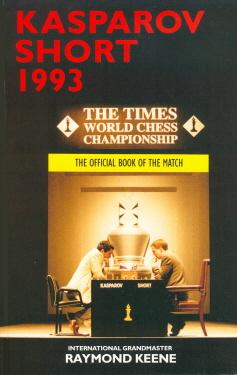
With regard to the interview in your 94/8 issue, Mr Bob Rice’s knowledge of chess and/or sense of fairness may be measured by his assertion on page 9 of the Batsford book on the 1993 Kasparov v Short match:
‘Although the World Championship matches have been arranged by many different organizations, the lineage of the 13 Champions has been recognized by all, including the World Chess Federation (FIDE), a group of national amateur bodies that arranged the last several matches.’
‘Last several’ means ‘last seventeen’.
(Letter from us on pages 8-9 of the 1/1995 New in Chess)
On page 7 of the December 2013 CHESS Nigel Short mentioned the Morphy game against the Duke and Count as his favourite of all time (‘First loves are always the deepest’).
On pages 52-53 of the 1/2014 New in Chess Nigel Short writes about rapid chess (defined in the article as games with ‘approximately half an hour per player’). The final paragraph:
‘In recent years, publishers have commissioned biographies of ever-more obscure, peripheral chess figures. I have read the weighty McFarland hardback of Albert Beauregard Hodges from beginning to end and I still can’t tell you anything about him. Quite possibly this is because I am a philistine, or an amnesiac, but the alternative explanation is that Hodges’ life is not an inherently interesting subject. Far better would be for some proper researcher to examine the enormous wealth of material on rapid chess and write its definitive history. With luck, this briefest of sketches may serve as a catalyst.’
A book on such a topic (ideally, on all forms of fast chess) could certainly be an excellent addition to the thematic chess books of McFarland & Company, Inc., which include Blindfold Chess by E. Hearst and J. Knott (2009) and, alas, Women in Chess by J. Graham (1987), although not much else. Chess prodigies is another subject which would lend itself to the McFarland treatment.
As regards biographical works, a number of world champions and other leading players have been covered by McFarland authors, and some books, such as Reuben Fine by A. Woodger (2004), have been strangely neglected. Comprehensive, academic volumes on figures like Euwe and Fischer would be highly desirable additions, as would English translations of the large volumes on, for instance, Tarrasch and Janowsky currently available only in German, as mentioned in C.N. 6803.
McFarland’s biographical tomes also feature many relatively unfamiliar masters (of whom Hodges is not the least familiar), and they are particularly welcome when, as is customarily the practice, they deal too with the overall chess context of the subject’s period and locality. For example, our Foreword to The Tragic Life and Short Chess Career of James A. Leonard, 1841-1862 by John S. Hilbert (2006) observed:
‘Yet while Leonard remains the focus of attention in these pages, the broader tableau of US chess in the early 1860s is also ably presented. So too is the agony of the Civil War, which cost Leonard his life.’
Writing such books demands much skill, to blend the proper level of documentary detail about the master (not an indiscriminate deluge) with a satisfying overview of the context (not simplistic waffle about geopolitics).
In certain areas McFarland needs to show considerably more rigour (in its choice of chess authors and in how it processes some books), but its catalogue continues to grow impressively. We hope to see many new books in all three categories mentioned above, i.e. on the world’s leading players, on unsung figures and on thematic topics.
(8530)
From page 153 of Check Mate and Word Games by Carlos Tortoza (Denver, 2006):
‘In 1993, Garry Kasparov, then champion created Professional Chess Association (PCA) worldwide for the FIDE, and Nigel Shorts for the organization and marketing of the series of games for the worldwide heading.
Kasparov and Short had accused to the FIDE with the professionalism lack and favoritism. Moreover, the two had refused to yield 25% of the prizes for the FIDE. The FIDE removed the heading of Worldwide Champion of Chess of Kasparov and denied the Shorts the right to defy Kasparov.’
Two years later:
‘The PCA finished for leaving to exist due to sponsorship, when the Intel left to subvention the association ...’
(9025)
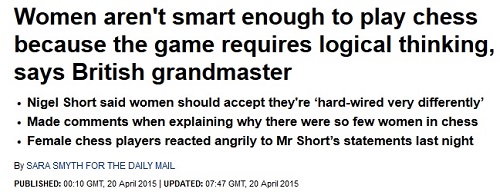
Newspapers are forever reporting alleged anger, fury, etc. vented ‘last night’. (Profound discontent generally seems nocturnal.) The original report about Nigel Short, in the Daily Telegraph of 20 April 2015, illustrates how news stories may nowadays be confected from Twitter, and one tweet grabbed is a claim that Short’s comments were ‘incredibly damaging’. (‘Incredibly’ generally means ‘very’.) Last night’s ire is a curiously delayed reaction to an article by Short, ‘Vive la Différence’, on pages 50-51 of the 2/2015 New in Chess – an issue which was published a month ago but evidently remained unavailable last night, and even today, given that much of the coverage bears little relation to what Short wrote in the Dutch magazine.
It is incredibly easy to express simplistic views on the topic of chess and women in ignorance of the key factors, whether biological, cultural, psychological, sociological, etc., which may or may not explain any differences between male and female chessplayers, whether now or in the past. We have made that last sentence as woolly as possible to underscore the futility of such general, synthetic ‘debates’, which concern, in full or in part, questions of opinion and taste.
If Nigel Short’s New in Chess article contained factual mistakes, misquotations, faulty statistics, bad writing or plagiarism, there would be every reason to complain, but we have seen no attempt to rebut, even, this important paragraph of his on page 51:
‘Given Susan Polgar’s undoubted genuine achievements – such as being the first woman to earn the Grandmaster title conventionally by making three norms – it is tragic that her brand is tarnished by extravagant and literally incredible claims like her supposed world record in 2005 of playing 1,131 games consecutively (winning 1,112!) in just 990 minutes. This works out at just 52.5 seconds per game – although it would be somewhat less when one takes into account bathroom breaks. Given that she was walking around the whole time, which causes a second or seconds to be lost on [e]very move, for this record not to be fictitious would require an extraordinary high number of Scholar’s Mates. It is hard to understand why an emotionally stable individual would even imagine anyone else might believe this record to be genuine.’
(9244)
Nigel Short’s article was so bad that few, if any, top-level masters have expressed agreement with it. Nigel Short’s article was so good that few, if any, top-level masters have expressed disagreement with it.
There are other possibilities too, of course, and of all the lessons to be learned from the shambolic, sprawling rumpus over ‘Vive la Différence’ (an article still being discussed by individuals who have not read it) a neglected one is mentioned here, in the context of any current issues (as opposed to history and lore): the lack of a proper on-line chess forum where topical controversies can be discussed in depth; where comprehensive and comprehensible coverage is founded on facts and informed opinions; where contributions bear the writer’s real name; where hearsay is absent; where wit is welcome but glib illiterates are not; where Internet links are supplied only if they lead to something worthwhile; where irrelevancy and repetition are avoided; where strong criticism of people and of ideas is expressed solely if based on substantiated information; where all relevant sources are cited; where points are not deemed true, or even noteworthy, merely because they come from the mainstream media; where press articles by non-chess-specialists are treated not with automatic gratitude but with particular caution; where misquotation is excoriated; where the debate, however lively, is moderated with rigorous even-handedness; where good linguistic standards are ensured; where contributors and readers are treated with the respect that they deserve; where anyone, including top-level masters, would be proud to have a contribution posted.
Wanted: one topical chess forum where 100% of the contributions are worth reading, and not 100 forums where 1% are.
(9254)
On pages 36-37 of the 4/2015 New in Chess Nigel Short has written a follow-up article, ‘A Beautiful Minefield’, discussing reaction to ‘Vive la Différence’ (published on pages 50-51 of the 2/2015 issue). A brief extract:
‘On 20 April an article appeared in The Daily Telegraph entitled “Nigel Short: Girls Just Don’t Have the Brains to Play Chess”. Never mind the fact I didn’t say that, it was a catchy headline to set me up as a misogynist pantomime villain. In extraordinary rapid succession came a whole series of similar articles, in The Guardian, The Times, The Independent, many with totally fabricated quotes and grotesque distortions – such as the Daily Mail’s “Women aren’t smart enough to play chess because the game requires logical thinking, says British Grandmaster”, despite me having said nothing at all about logic.’
Indeed so, notwithstanding Raymond Keene’s assertions in an item for the Spectator placed on-line on 22 April 2015 (i.e. over a month after the 2/2015 issue of New in Chess appeared):
‘According to Short’s comments, the female brain fails in the logic department, hence girls will never be able to match boys over the chessboard ...
Even if Nigel has a point about logic, at least one of the greats of chess history is not on his side. As the brilliant tactician and incandescently creative world champion Alexander Alekhine once said, “chess is not only knowledge and logic!”.’
(What Alekhine ‘once said’ can be found in the final note to his victory over Reshevsky, Kemeri, 1937, in his second volume of Best Games.)
Many so-called journalists, from Raymond Keene upwards, have written about Nigel Short’s ‘Vive la Différence’ article without bothering to read it, but it cannot be assumed that they, or the hordes of unpaid opinionizers on-line, would have had anything worth writing even if they had read it. C.N. 9051 observed that ‘technology increasingly encourages people, including the uninformed and illiterate, to share their opinions about tout ce qui bouge’. The complex issues concerning chess and women, and Nigel Short’s views thereon, merit rigorous scrutiny and discussion. That has yet to start.
The tornado of the past two months has contributed virtually nothing, beyond providing a text-book example, notable well beyond the chess world, of how the media often operate nowadays. At their worst, they wake up late, scavenge, copy, misinterpret, invent, pontificate and then move on to wreak havoc elsewhere. The process is aggravated by a recent development: convergence of the viciously shallow press and on-line outlets such as Twitter, so that kneejerk reactions abound and maelstroms are inevitable.
In such circumstances, no mature discussion of the relative weakness, or otherwise, of female chessplayers is possible. What has been on abundant offer, however, is incontrovertible proof of the irremediable weakness of commentators, irrespective of their sex.
(9344)
Has any article in chess history been so misrepresented as Nigel Short’s on female players in New in Chess?
On 22 April 2015 ChessBase reproduced the complete text of the ‘Vive la Différence’ article.
On 18 December 2020 Nigel Short posted on the English Chess Forum the complete text of ‘A Beautiful Minefield’.
From C.N. 9254 (written a decade ago, in intentionally utopian style):
Of all the lessons to be learned from the shambolic, sprawling rumpus over ‘Vive la Différence’ [a New in Chess article by Nigel Short on women’s chess ...] a neglected one is mentioned here, in the context of any current issues (as opposed to history and lore): the lack of a proper online chess forum where topical controversies can be discussed in depth; where comprehensive and comprehensible coverage is founded on facts and informed opinions; where contributions bear the writer’s real name; where hearsay is absent; where wit is welcome but glib illiterates are not; where Internet links are supplied only if they lead to something worthwhile; where irrelevancy and repetition are avoided; where strong criticism of people and of ideas is expressed solely if based on substantiated information; where all relevant sources are cited; where points are not deemed true, or even noteworthy, merely because they come from the mainstream media; where press articles by non-chess-specialists are treated not with automatic gratitude but with particular caution; where misquotation is excoriated; where the debate, however lively, is moderated with rigorous even-handedness; where good linguistic standards are ensured; where contributors and readers are treated with the respect that they deserve; where anyone, including top-level masters, would be proud to have a contribution posted.
Wanted: one topical chess forum where 100% of the contributions are worth reading, and not 100 forums where 1% are.
No topical forum along remotely similar lines has yet emerged. The current battles over online cheating are a grimly undignified, barely intelligible mess with, as their hub, nothing better than X/Twitter.
There must be a better way.
(12166)
From our experience, five hosts stand out for the quality of their live (English-language) commentary on major matches and tournaments. Beyond chess competence, they have a range of attributes which include clarity of expression and an engaging personality that is distinctive but not domineering. For hours on end, alone or in pairs, they explain the obvious and the complex to a heterogeneous audience by no means all of English mother tongue, and when they do not know, they say that too. The gift of omniscience is left to that unseemly brigade (in homes and offices with full computer support) addicted to disrespectful, pointless and illiterate tweeting throughout all waking hours.
The hosts will inevitably be criticized whatever they say or do. Some viewers will want more analysis and gravitas, others more discursiveness and jokes. Some relish passive viewing of the event, while others insist on being in on it. This means that the commentator, already required to scrutinize a number of screens simultaneously, is also expected to handle some of the opinions and questions which, unfortunately, scroll into view from hoi polloi: ‘would carlson of beat fisher?’
The best broadcasters, one feels, would be entertaining too at a local club match or, indeed, if there were no play at all. During any lull, urbane digressions often display a gratifying interest in chess history and lore. When play is over, the commentators switch to showing their interviewing technique and empathy, and not least when the tousled loser arrives for questioning on what caused his demise five minutes earlier. A striking quality of the broadcasts is the absence of national bias. Patriotism and jingoism have no place in them.
Not so long ago, Internet broadcasts could be amiable chaos, with the arrival of a guest causing apparent consternation and a scramble for an extra chair and microphone. Guests often appeared without identification. A background hum indicated a would-be contribution to the proceedings from somebody in the commentators’ area who could be seen and heard only by them. The viewer might see that a move had been played well before the broadcasters realized it. Breakdowns were commonplace.
Technical, logistical and analytical mishaps will always occur, but a nimble, unflappable commentator takes them in his stride and may even exploit them for additional entertainment. A key reason why the broadcasts are enjoyable is that the broadcasters so obviously enjoy them. The whole genre of live commentary is ideally suited to the Internet and, by some miracle, it is provided free of charge. Having mentioned at the start of these observations that five hosts stand out, we name them, in alphabetical order: Jan Gustafsson, Daniel King, Yannick Pelletier, Yasser Seirawan and Nigel Short.
[Feature article including additional material: Chess Broadcasts on the Internet. On 27 March 2016 a sixth name was added: Robin van Kampen.]
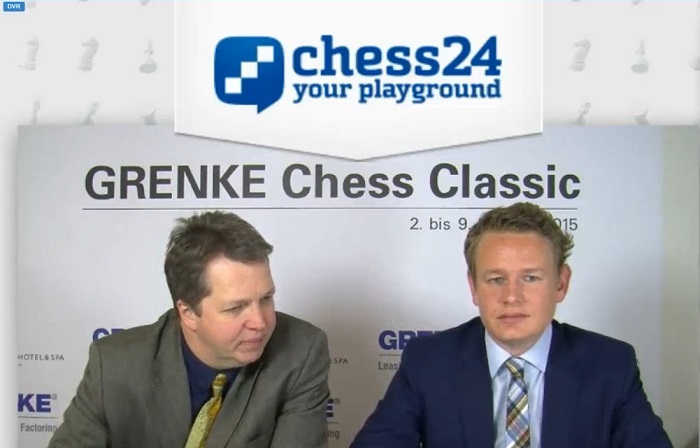
Nigel Short and Jan Gustafsson, 9 February 2015
(image reproduced with the permission of chess24)
(9085)
On pages 36-37 of the 7/2015 New in Chess Nigel Short’s article about chess magazines includes this observation regarding the BCM:
‘Sadly, this once esteemed gazette has barely crawled into the 21st century, on life-support and with reputation threadbare, but, for much of its long existence, with its donnish prose, historical articles and news from distant dominions, it was a very fine read.’
Short also refers to the Australasian Chess Review and Chess World, edited by Cecil Purdy:
‘The first World Correspondence Champion had such an admirable way of explaining games and expressing ideas with great clarity that it is no wonder that Bobby Fischer held him in high regard.’
Fischer’s opinion of Purdy as a teacher and annotator has often been mentioned, and we should like to cite any direct statements made by the American. In the meantime, an extract from the back cover of Purdy’s Guide to Good Chess (Davenport, 2006):

(9561)
Regarding Fischer on Purdy, see too C.N. 11673.
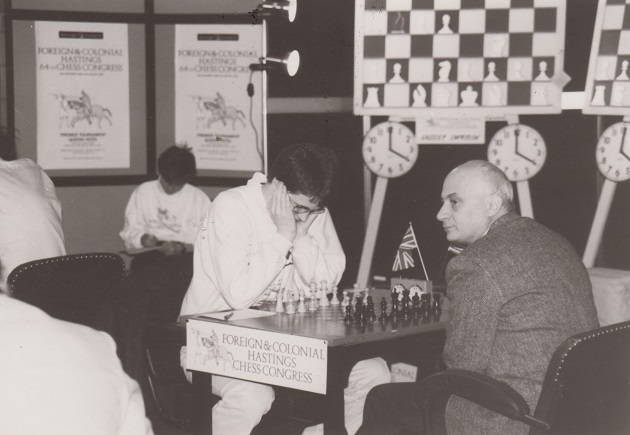
Nigel Short and Boris Gulko, Hastings, 1988-89
(9787)
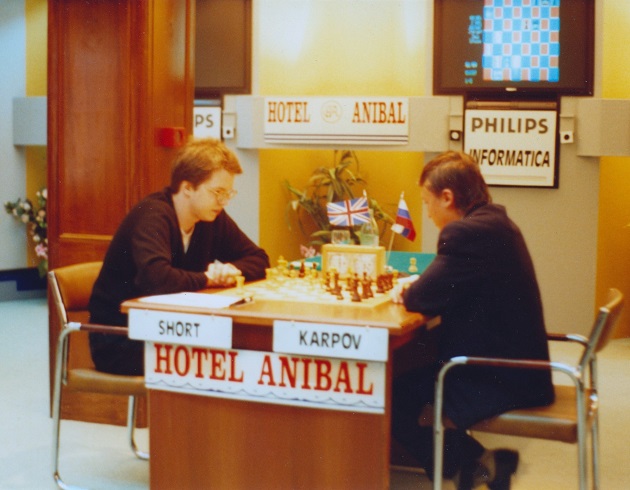
Nigel Short and Anatoly Karpov, Linares, 1992
(9997)
Not once but twice a chess book by ‘an academic professor of psychology, philosophy, sociology and economic business administration’ quotes Nigel Short on Bobby Fischer:
‘Why it finds the Bush administration for necessary a 61 years old man too rushed, nobody except itself selbste a danger represents is a mystery.’
That is from a book discussed in C.N.s 4716 and 9025, Check Mate and Word Games by Carlos Tortoza (Denver, 2006).
From page 157:

And from page 168:

Information about the ‘academic professor’ on the back cover:
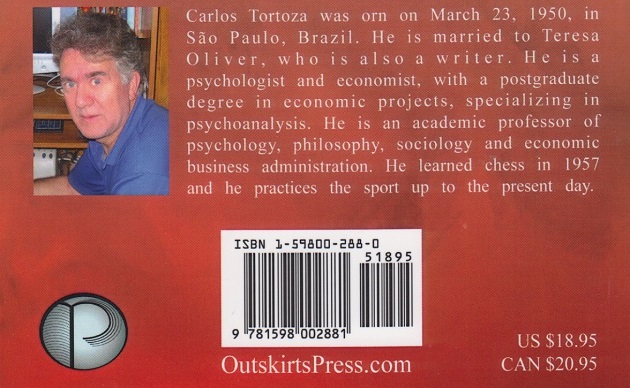
It takes a few seconds to find on-line Nigel Short’s actual words, in his Sunday Telegraph chess column of 22 August 2004:
‘Why the Bush administration finds it necessary to hound a 61-year-old man who poses no danger to anyone but himself is a mystery.’
(10536)
Sean Robinson (Tacoma, WA, USA) expresses disappointment at the small number, and low quality, of books about Nigel Short, notwithstanding his stature as the only British player to contest a world championship match in the modern era.
There is certainly a significant gap in the market. Although our shelf has monographs on Short published in Argentina, Germany, Hungary, Spain, the United Kingdom and the United States, they are mostly booklets, and only the 79-page volume from Hungary, which covered the period 1990-95, came out after 1993.
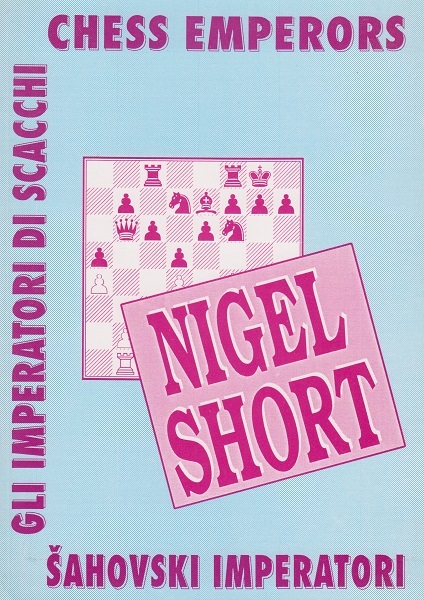
(10770)
Michael Allard (Bowie, MD, USA) notes a book with extensive treatment of the games of Nigel Short and Jan Timman: The Way to Linares’ Summit by Alexander Kulagin (Würzburg, 1993).
(10774)
From our file of Evening Standard cuttings we present a montage of some articles by Leonard Barden:
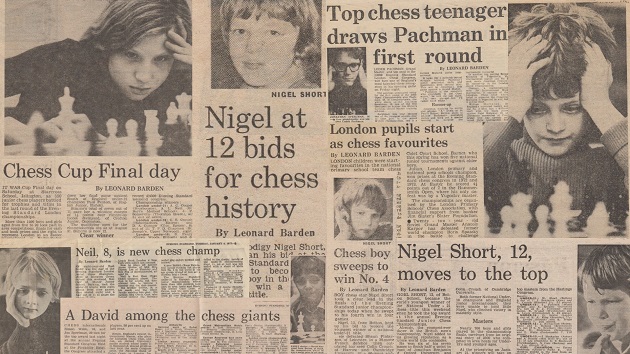
The players are Neil Carr (4 January 1977), Julian Hodgson (11 May 1974), Simone Leberman (7 January 1974), David Norwood (1 August 1977), Nigel Short (28 December 1977, 30 December 1977 and 3 January 1978) and Jonathan Speelman (12 December 1972).
(10990)
Olimpiu G. Urcan (Singapore) points out these Twitter exchanges involving Nigel Short and Raymond Keene:
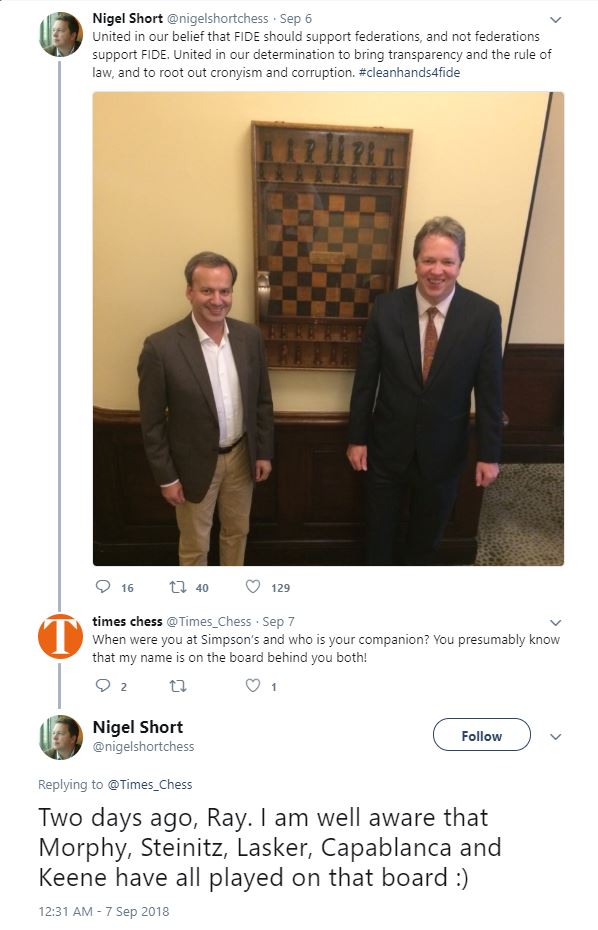
Raymond Keene’s inability to recognize Arkady Dvorkovich is as pitiful as his pride in the defilement of the Simpson’s-in-the-Strand chessboard.
(11004)
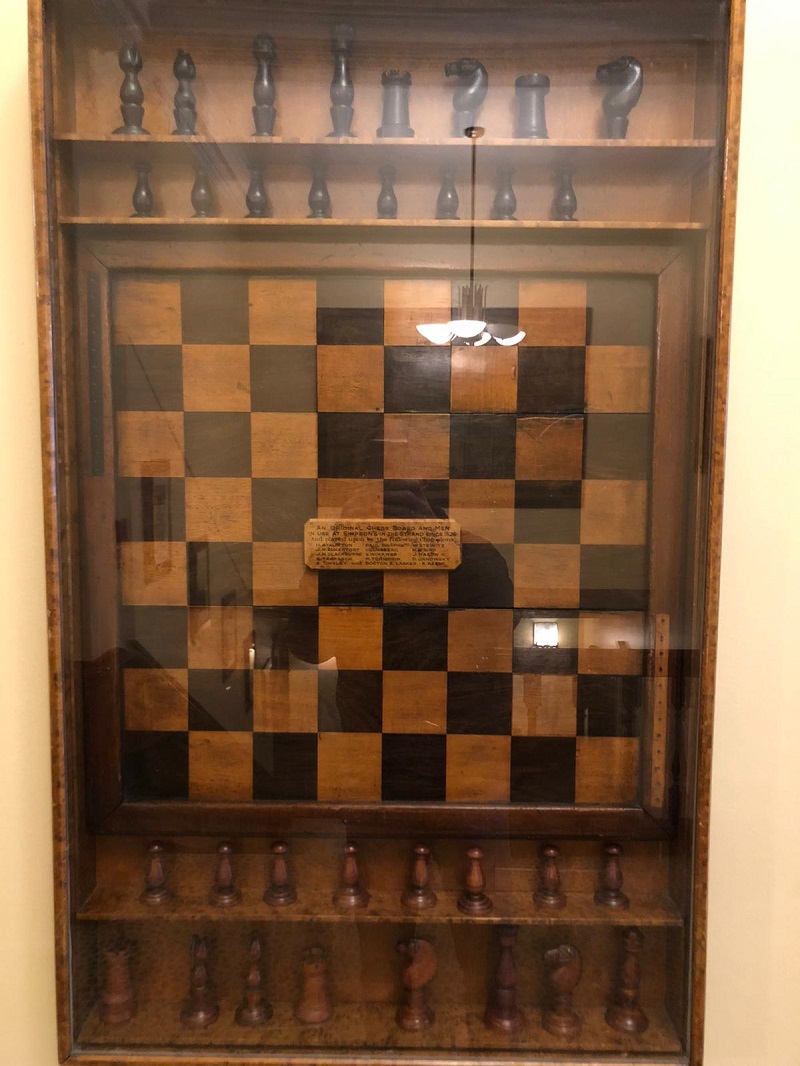
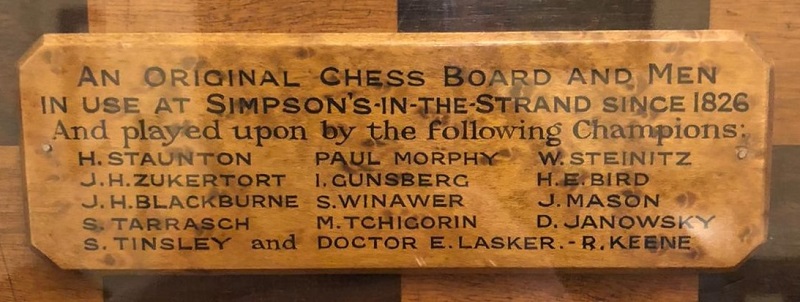
We are grateful to Nigel Short for permission to reproduce here, and in Chess and British Royalty, a letter from Diana, Princess of Wales (1961-97) which he received following his match against Kasparov in 1993 and which he has recently made public on his Twitter page:
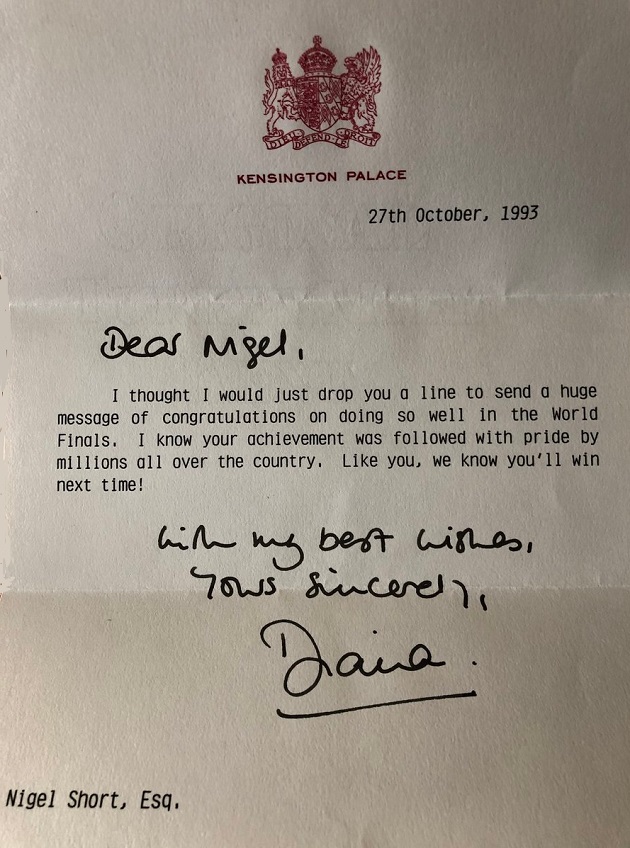
(11496)
How do such things happen?
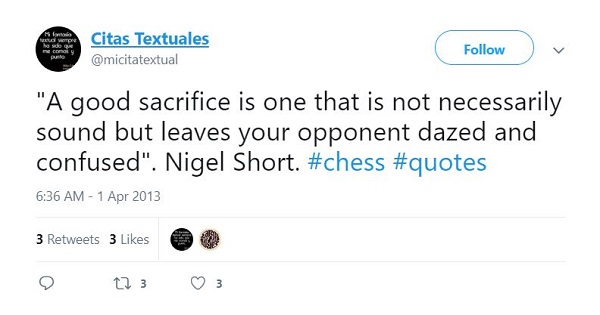
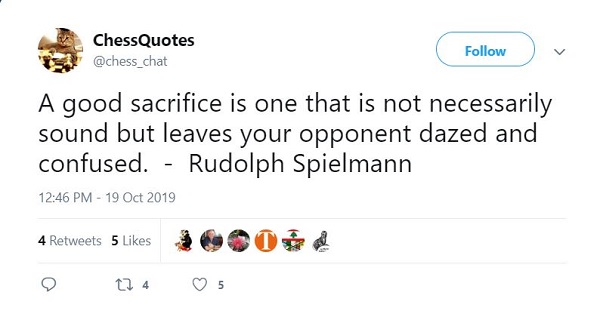
(11534)
A pseudo-patriotic cliché to be discouraged is in David Howell’s chess column in The Times, 18 January 2020:
‘... along with commentary by Britain’s own Nigel Short.’
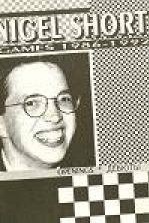
Nigel Short informs us:
‘This poor-quality image is the only one that I have. It appears that the book was a games collection, Nigel Short by R.A. Ziatdinov (Tashkent, 1993), and that most of the copies were destroyed in a flood, although about 100 were sent to Turkey.’
We shall be glad to hear from any reader who has the volume.
Addition on 9 April 2020:
Reporting that he has a signed copy of the Ziatdinov book, Rudy Bloemhard (Apeldoorn, the Netherlands) has sent us a selection of images, including the following:
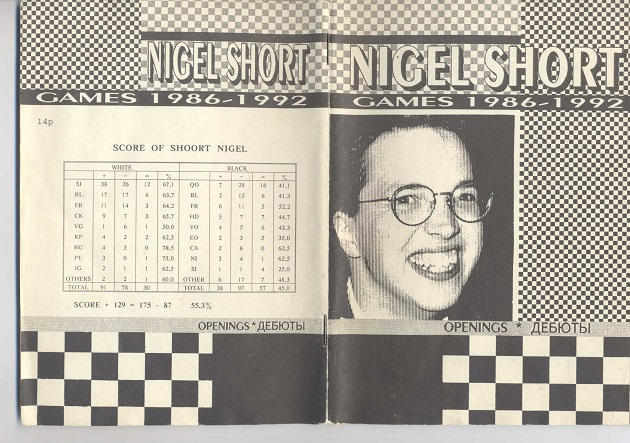
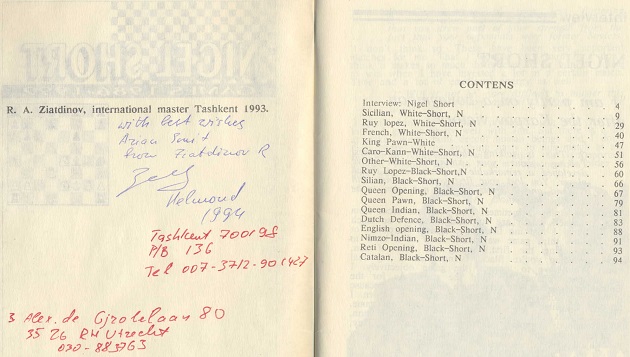
Mr Bloemhard adds:
‘There is no reference to a publisher or an ISBN number. The book, published in 1993, is 96 pages long and contains about 350 unannotated games.’
Various collections curated by Getty Images have little-known photographs of Nigel Short.

From a review by Nigel Short (Sunday Times, 30 December 2007) of White King and Red Queen by Daniel Johnson (London, 2007), regarding The Termination:
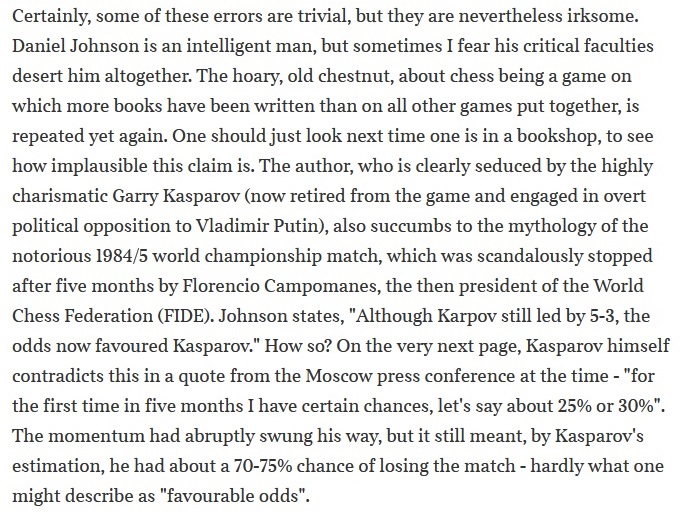
Addition on 25 May 2021:
Towards the end of C.N. 11864 we wrote, concerning Fifty Shades of Ray by Raymond Keene (Edinburgh, 2021):
Leaden repetition of titles is embarrassingly frequent (see, for instance, how Nigel Short has the misfortune of being referred to) ...
Here we add a series of such references in the book:
(Nigel Short is one of 12 FIDE Vice Presidents.)
Addition on 23 June 2022:
On his Twitter page on 21 June 2022, Nigel Short announced his resignation from his Vice-President post with immediate effect.
Addition on 20 October 2002:
On 13 October 2022 FIDE announced its new Management Board, which included Nigel Short as the Director for Chess Development.
Addition on 21 August 2023:
In the 18 November 2001 edition of the Sunday Telegraph (page 25 of the Review Section), Nigel Short’s chess column discussed Tony Miles at length and is still remembered today for one passage:
‘By the time of the Dubai Olympiad in 1986 such was the difference in our rankings it was clear to the unbiased observer that Tony’s decade long grip on the top spot was over. Nevertheless with Tony as a selector I found myself occupying board three to the incredulity of most, including an astonished Kasparov. An American reporter who unwisely mentioned this irregularity in the tournament bulletin was punched to the ground by the robust Tony. I obtained a measure of revenge not only by eclipsing Tony in terms of chess performance but also by sleeping with his girlfriend, which was definitely satisfying but perhaps not entirely gentlemanly.’
Mention was made of Miles’ gamesmanship, and mental illness in the 1980s, but despite writing ‘I never actually liked Tony’ Nigel Short also acknowledged Miles’ ‘huge talent’. For example:
‘His contribution to British chess was immense. He spearheaded the explosion of talent in this country that took us from rank mediocrity to second strongest chess nation, behind the USSR, during the 1980s.’
‘Tony pushed British chess to new horizons by being thoroughly professional, tough as nails and extremely determined.’
‘He wrote excellent occasional columns for the Chess Café on the Internet and was a popular commentator on the ICC.’
‘His loss is a sad blow to British chess. He was our most significant player since Joseph Blackburne in the nineteenth century. He was a pioneer who paved the way for others to follow. For this we owe him a debt of gratitude.’
The column concluded with a game ‘of exquisite beauty’, Miles’ victory over Boris Spassky at Montilla, 1978.
Addition on 21 September 2024:
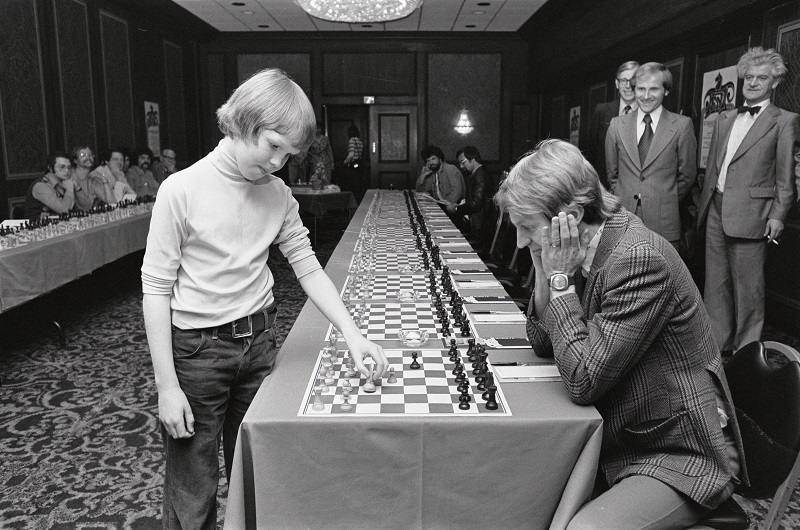
When this photograph was contributed by Olimpiu G. Urcan on 4 November 2021, we reproduced the information given by the source (BNA Archive), i.e. that it was a May 1976 shot of Nigel Short in play against Friðrik Ólafsson.
However, Leonard Barden informs us that the Archive’s details are mistaken. Short is facing an unidentified opponent at Salters’ Hall, London in February 1978, i.e. on the occasion of the simultaneous exhibition discussed by G.H. Diggle in C.N. 7089 above.
Addition on 26 October 2024:
From the concluding paragraph of an article by Dominic Lawson ‘Our white knight meets a Russian king’ on page 20 of The Observer, 19 April 1992:
‘Whatever the claims made on his behalf by others, Nigel has never spoken of himself as a genius. “Chess at this level” he told me, “requires nothing more than a combination of above-average intelligence, an early response to the game, and lots of practice.”’
Having previously asked readers to imagine themselves as the editor of a chess quotations book (C.N. 11994) and of a single-volume chess encyclopaedia (C.N. 12035), we now invite them to assume the role of a mainstream journalist commissioned to produce a chess article on recent allegations of online cheating. Where to look for the essentials? Where to find output in which opinions, biased or not, do not leap-frog over facts?
The journalist may dive in at some random point proposed by Google, only to find barely comprehensible arguments deployed with links to barely comprehensible X/Twitter posts or YouTube videos, as various parties and partisans compete with declarations, interrogations, accusations and insinuations. But where are a placid, objectively formulated overview and chronology of how any given point was reached? In brief, where is the journalism?
This is not new. Nearly a decade ago, Nigel Short wrote in New in Chess about the differences between male and female chessplayers, and an outcry ensued, unhurriedly. If a journalist today seeks a reminder of the case, where to go? Should Google prove unhelpful, it may seem sensible to turn to a ‘standard’ source such as the Wikipedia entry on Short, but that fails too. It has 70 words on the affair and three endnotes, all three being links to ‘outcry’ articles by non-specialist writers in three UK newspapers, the Independent, the Guardian and the Daily Telegraph; all three articles, as it happens, were dated 20 April 2015. The New in Chess piece had been published about a month previously.
Wikipedia does not relate what Short had written in New in Chess, even though the full text was reproduced by ChessBase not long after the tumult began, and is still there. Nor does Wikipedia display awareness of Short’s follow-up article in New in Chess, which was, in part, a reply to the assertions in the three UK newspapers. The media had gorged themselves and, in terms of actual arguments, the second New in Chess article was, so to speak, even more ignored than the first one. Vive l’indifférence.
That was the shallow treatment of a controversy in 2015, and one looks in vain, even today, for a plain, factual account of it. How will the media of 2024 be judged in future years for their handling of the present cheating cacophony? Who will emerge with honour for showing care over facts and respect for fair play? Who will work hard to clarify the issues for the public’s benefit? And when will the process start?
(12060)
Addition on 14 November 2024:
An example of how the public record may be skewed is provided by the reaction, or lack thereof, to Nigel Short’s follow-up article (‘A Beautiful Minefield’) on pages 36-37 of the 4/2015 New in Chess, where he wrote, for instance:
‘On 20 April an article appeared in The Daily Telegraph entitled “Nigel Short: Girls Just Don’t Have the Brains to Play Chess”. Never mind the fact I didn’t say that, it was a catchy headline to set me up as a misogynist pantomime villain. In extraordinary rapid succession came a whole series of similar articles, in The Guardian, The Times, The Independent, many with totally fabricated quotes and grotesque distortions – such as the Daily Mail’s “Women aren’t smart enough to play chess because the game requires logical thinking, says British Grandmaster”, despite me having said nothing at all about logic.’
C.N. 9344 quoted that rebuttal, but where else can it be found on the Internet? We see only one place, at the English Chess Forum, where, on 18 December 2020, Short reproduced the full text of ‘A Beautiful Minefield’.
To the Chess Notes main page.
To the Archives for other feature articles.
Copyright: Edward Winter. All rights reserved.